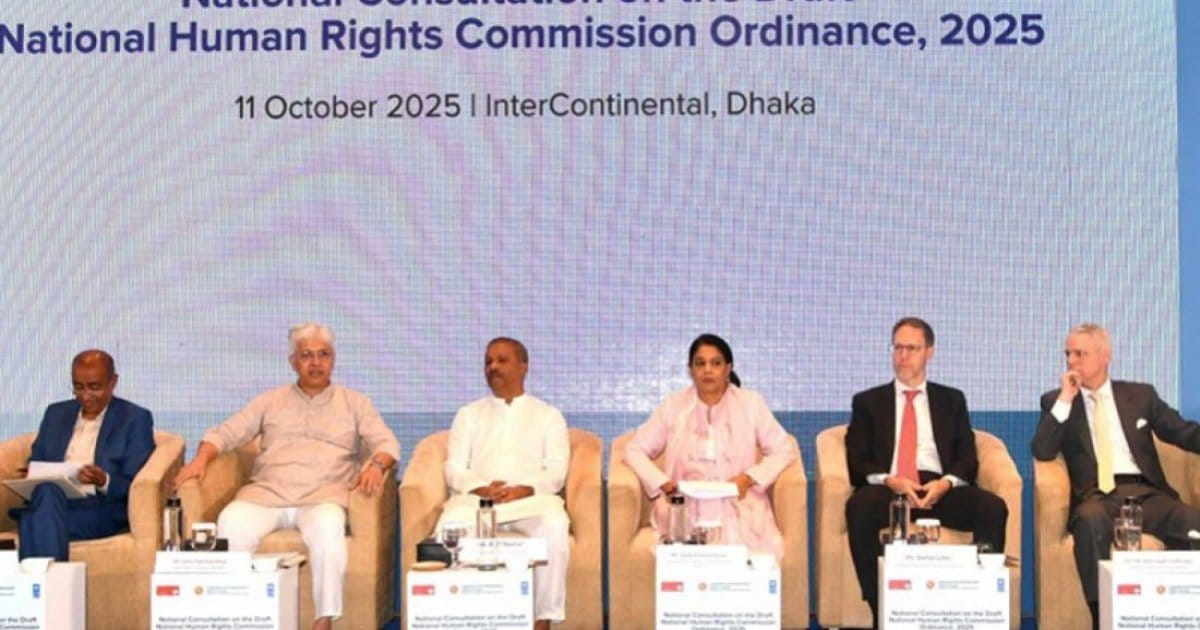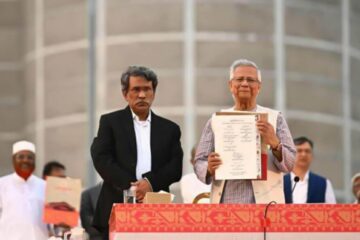Law Adviser Dr Asif Nazrul has said that while the idea of a “safe exit” is often discussed in political circles, it is not the advisers who require one, but rather the nation itself, which must find a way out of its current dysfunctional state structure.
He made the statement while speaking at the national consultation meeting on the draft of the “National Human Rights Commission Ordinance, 2025,” held at the ballroom of the InterContinental Hotel in the capital on Saturday afternoon.
Dr Asif Nazrul said: “Over the past 55 years, we have witnessed misrule, enforced disappearances, extrajudicial killings, and the looting of people’s deposits from banks. The real safe exit for this nation lies in freeing ourselves from such a dreadful and self-destructive state structure.”
He further said: “The constitution of 1972 stated that the president would appoint judges independently, free from political influence. But in practice, no president has ever been able to do so independently—judicial appointments have always been made according to the will of prime ministers.”
He added: “We have even seen chief justices who have led human rights violations and contributed to the destruction of democracy and the electoral system. Some have witnessed disappearances and extrajudicial killings with their own eyes yet remained silent, failing to ensure accountability for the perpetrators.”
Expressing regret, Dr Nazrul said: “Some of these individuals still remain within the judiciary. Although we have taken some steps towards reform, we could not go all the way. The greater responsibility now lies with the future elected government.”
The law adviser said: “We are enacting good laws, but legislation alone is not enough—institution-building is the greater challenge. Building strong institutions is a long process, and I believe this new law will enable the establishment of a strong and effective Human Rights Commission.”
He added: “To move beyond the current state structure, several institutions must be strengthened—among them, the higher judiciary and the parliamentary committees are most important. At the same time, the Human Rights Commission must stand firm, otherwise any citizen could become a victim of rights violations at any time.”
Adviser to the Ministry of Housing and Public Works Adilur Rahman Khan said: “Through this joint reform process, it is crucial to establish a credible and effective Human Rights Commission. If the commission can be formed before the upcoming election, ensuring the security of every citizen will be easier.”
He further said: “The National Human Rights Commission should be an institution that operates independently and fearlessly, free from political influence, and acts as a bridge between the state and citizens on all matters of human rights.”
Adviser to the Ministry of Environment, Forest and Climate Change Syeda Rizwana Hasan said: “Protecting environmental human rights defenders is now a global priority. Around the world, they are facing killings and violence—an issue the United Nations treats with utmost seriousness. Bangladesh’s laws must reflect this concern.”
She said: “The judiciary plays a crucial role in protecting human rights. Although the courts often provide directives, implementation remains limited. The proposed draft ordinance is overall well-structured, covering elements like investigation, recommendation, compensation, training, advisory services, arbitration, and mediation. What is needed now is to make the commission functional and capable.”
Rizwana Hasan added: “The commission’s recommendations should not remain merely moral but must carry legal weight. A legal framework is essential to enforce decisions made through arbitration or mediation. The definition of person should include government agencies and law enforcement authorities. The commission should have its own legal panel and maintain close coordination with law enforcement bodies.”
She further said: “This law will complement future laws like the Police Commission Act, Women’s Commission Act, Enforced Disappearance Investigation Commission Act, and Media Commission Act. Therefore, alignment and coherence among these laws must be ensured from the outset.”
Attorney General Md Asaduzzaman said: “The Human Rights Commission should not rely solely on recommendations; its decisions must be enforceable. The commission can only be effective by maintaining a balance between independence and accountability.”
Swiss Ambassador Reto Siegfried Renggli said: “Switzerland stands beside Bangladesh in strengthening trust, justice, and human rights between the state and its citizens. An independent and credible Human Rights Commission will further solidify the social contract between the government and the people.”
Deputy Head of Mission of the Danish Embassy Anders B Carlsen said: “Ensuring the commission’s independence and autonomy is a precondition for its effectiveness. We hope all stakeholders will work together to turn this draft into a strong institution.”
UNDP Bangladesh Resident Representative Stefan Liller said: “We welcome this government–civil society collaboration. It marks the most extensive and inclusive consultation process on the Human Rights Commission in Bangladesh’s history.”
He added: “The UNDP has long been a partner in Bangladesh’s journey toward human rights and good governance, and this cooperation will continue in the future.”



